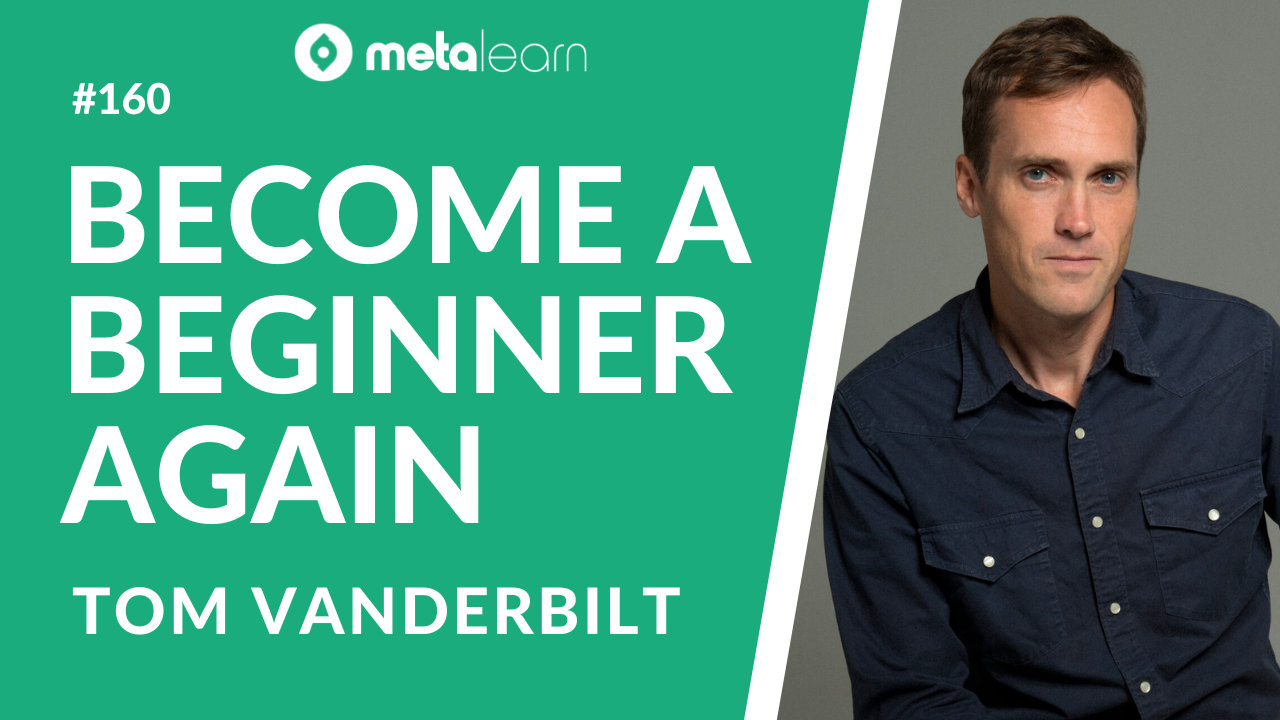ML160: Tom Vanderbilt on Channelling Beginner's Mind, Overcoming Limiting Beliefs and The Joy of Lifelong Learning
Discover the pain and joy of being an amateur and why it is important, the criteria for learning new skills and picking teachers, and the unexpected benefits of picking up new things.

Tom Vanderbilt is a journalist and author of the book Beginners: The Curious Power of Lifelong Learning. He's written for a range of high profile publications including Wired, The Financial Times, The Wall Street Journal, Rolling Stone and The New York Times Magazine.
Beginners, which is the main focus of our conversation, explores Tom's experience learning a whole range of new skills including drawing, juggling, surfing and much more.
When he became a parent Tom was knocked out of his mid-career comfort zone and put in the position of becoming a teacher and learner. He found himself trying to teach his daughter something almost every day and that inspired him to become a beginner again. In this conversation we discuss:
- The pain and joy of being an amateur and why it's so important
- Tom's criteria for learning new skills and picking teachers
- The unexpected benefits of picking up new skills
The limiting beliefs that stop us from learning new things are often so difficult to overcome because they're invisible and in this conversation, we map the territory so you can break through and feel good about becoming a beginner again.
Show Notes
- Introducing Tom Vanderbilt [00:36]
- Why was university more enjoyable for Tom than school? [02:16]
- How does deskilling happen from an early age? How does it affect our choice of career in later life? [03:53]
- What was the life event that inspired Tom to write Beginners? What was the stigma that he had to overcome to continue his learning process? [06:21]
- How does Beginners frame the learning process? [09:56]
- What are the limiting beliefs that can slow down, or even inhibit, learning? How can we get over these hurdles, especially as an adult trying something new? [12:17]
- How do we decide which things we want to start learning? What is the idea behind being more marketable to oneself versus to employers? [16:07]
- How can we bring pleasure back into things we used to enjoy doing in a world that values performance and quantitative metrics? [20:18]
- What can our hobbies potentially say about the jobs we have? Why do we feel compelled to engineer our hobbies with performance metrics? [24:02]
- How can setting clear goals affect our motivation to learn? How should we approach goals without compromising the satisfaction behind achieving them? [26:31]
- What was Tom’s process of choosing his teachers? [30:26]
- How has the lockdown changed how people learn, either by themselves or with peers? What are learning factors that can get lost with online learning? [31:51]
- As a distinguished journalist and with several books under his belt, what does Tom think his area of mastery is? [34:51]
- What are the two things that you need to become a better writer? Why is it important to incorporate humility in the learning process? [36:08]
- Despite networking not being a particular goal, how does learning new things bring people together? [38:32]
- How does learning new skills further develop our self-identity? What is a ‘life resume’? [40:40]
- Closing remarks [45:03]
Resources
Follow Tom Vanderbilt online
- Beginners by Tom Vanderbilt
- Traffic: Why We Drive the Way We Do by Tom Vanderbilt
- The Little Book of Talent by Daniel Coyle
- The Talent Code: Greatness Isn't Born. It's Grown. Here's How. by Daniel Coyle
- Living with a SEAL: 31 Days Training with the Toughest Man on the Planet by Jesse Itzler

